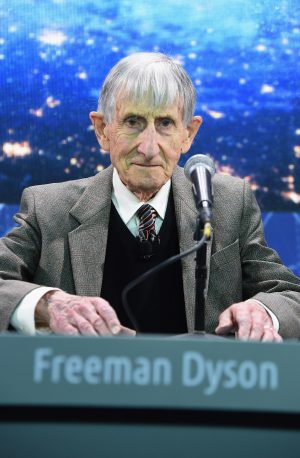Dyson's ideas even made it to where no man has gone before.
Freeman Dyson, a physicist whose interests often took him to the edge of science fiction, has died at the age of 96. Dyson is probably best known for his idea of eponymous spheres that would allow civilizations to capture all the energy radiating off a star. But his contributions ranged from fundamental physics to the practicalities of using nuclear weapons for war and peace. And he remained intellectually active into his 90s, although he wandered into the wrong side of science when it came to climate change.
Degrees? Who needs 'em?
It's difficult to find anything that summarizes a career so broad, but a sense of his intellectual energy comes from his educational history. Dyson was a graduate student in physics when he managed to unify two competing ideas about quantum electrodynamics, placing an entire field on a solid theoretical foundation. Rather than writing that up as his thesis, he simply moved on to other interests. He didn't get a doctorate until the honorary ones started arriving later in his career. His contributions were considered so important that he kept getting faculty jobs regardless.

Freeman Dyson at the introduction of Breakthrough Starshot, an idea with a sci-fi aura that's based on well understood physics. (credit: Gary Gershoff / Getty Images)
That came after a fairly conventional start to his education: an undergraduate degree from the University of Cambridge. Like many other scientists at the time, his career was interrupted by World War II, with Dyson working at the Royal Air Force's Bomber Command, evaluating data from completed missions and finding ways of getting more out of the nation's aircraft. After the war, he returned to Cambridge to finish his degree, then started in a PhD program at Cornell University in the US.
No comments:
Post a Comment